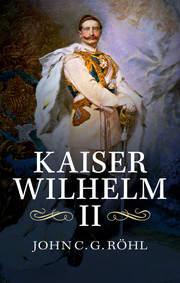Book contents
- Frontmatter
- Dedication
- Contents
- List of figures
- Acknowledgements
- Preface to the English edition
- Preface to the German edition
- Acknowledgements
- Overview: Wilhelm the Last, a German trauma
- Part I 1859–1888: The Tormented Prussian Prince
- Part II 1888–1909: The Anachronistic Autocrat
- Part III 1896–1908: The Egregious Expansionist
- Part IV 1906–1909: The Scandal-Ridden Sovereign
- Part V 1908–1914: The Bellicose Supreme War Lord
- Part VI 1914–1918: The Champion of God’s Germanic Cause
- 25 The Kaiser’s war aims
- 26 The impotence of the Supreme War Lord at war
- 27 Downfall: the collapse of the Hohenzollern monarchy
- Part VII 1918–1941: The Vengeful Exile
- Notes
- Index
26 - The impotence of the Supreme War Lord at war
Published online by Cambridge University Press: 05 September 2014
- Frontmatter
- Dedication
- Contents
- List of figures
- Acknowledgements
- Preface to the English edition
- Preface to the German edition
- Acknowledgements
- Overview: Wilhelm the Last, a German trauma
- Part I 1859–1888: The Tormented Prussian Prince
- Part II 1888–1909: The Anachronistic Autocrat
- Part III 1896–1908: The Egregious Expansionist
- Part IV 1906–1909: The Scandal-Ridden Sovereign
- Part V 1908–1914: The Bellicose Supreme War Lord
- Part VI 1914–1918: The Champion of God’s Germanic Cause
- 25 The Kaiser’s war aims
- 26 The impotence of the Supreme War Lord at war
- 27 Downfall: the collapse of the Hohenzollern monarchy
- Part VII 1918–1941: The Vengeful Exile
- Notes
- Index
Summary
Despite the fact that, during the war, Kaiser Wilhelm spent most of his time at Supreme Headquarters, it is clear that he was not involved with military operations. He was condemned to inaction, and his suite – to spare him – kept him only inadequately informed about the course of the war. He was subject to extreme mood swings, needed distraction, stayed away from Berlin and made not the slightest attempt to show, even symbolically, that he shared the sufferings of his people. In this way signs of the downfall of the Hohenzollern monarchy were already beginning to emerge in the first months of the war. Nevertheless, the role that Wilhelm II played in the First World War, at least initially, should not be underestimated. Until the appointment of the third Supreme Army Command under Paul von Hindenburg and Erich Ludendorff in August 1916 he had a decisive influence both on personnel policy and in the conduct of the war at sea. Indeed, formally the kingship mechanism of the personal monarchy continued to function until the collapse in November 1918, and obliged the Kaiser, however difficult it often was for him, to have the last word in all important decisions regarding the war. As a result, the influence of the three Cabinet chiefs, on whose advice Wilhelm depended, grew even stronger during the war.
The chief of the Military Cabinet, Moriz Freiherr von Lyncker, played a decisive role in the replacement of the luckless chief of the General Staff, Helmuth von Moltke, by Erich von Falkenhayn in September 1914. After the defeat at the battle of the Marne Moltke suffered another nervous breakdown and his immediate dismissal became inevitable. Under pressure from Lyncker Wilhelm nominated Falkenhayn, the Prussian war minister, to succeed Moltke. Despite criticism and intrigues he held on to Falkenhayn until his replacement by the powerful and immensely popular duo of Hindenburg and Ludendorff in the summer of 1916 could no longer be avoided.
- Type
- Chapter
- Information
- Kaiser Wilhelm IIA Concise Life, pp. 172 - 173Publisher: Cambridge University PressPrint publication year: 2014



